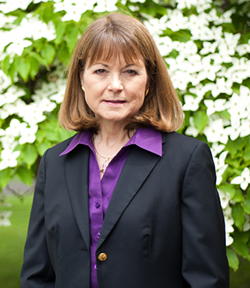In this regular feature, we hear from women academics and professionals about their lives, their faith, and the way it all intersects. Pull up a chair and join us as we chat with accountant and professor Cindy Guthrie.
Welcome, Cindy! Tell us about yourself.
 Name: Cindy Guthrie
Name: Cindy Guthrie
Current job: Associate Professor and Chair, Accounting and Financial Management, Bucknell University
Education: University of West Florida, BA, Accounting. Worked in public accounting and corporate accounting for 20+ years. University of Richmond, MBA; Virginia Commonwealth University, PhD.
A favorite activity: I grew up in the panhandle of Florida. We had beautiful sugar sand beaches and blue-green water. It was absolutely gorgeous, but because it was Florida, it was very flat, and we didn't really have deciduous trees. When I moved farther north and got to experience fall for the first time it was just amazing. Fall remains probably my favorite season because of the beautiful, beautiful colors, especially here in central Pennsylvania where you have mountains and hills. You get to see layers and layers of God's creation.
What was the hardest part of grad school and what kept you sane?
I got my PhD after being in corporate America for over 20 years, so first of all being poor wasn't particularly easy. I was used to a regular — fairly large — paycheck, so that was really different.
Being treated like you were less mature than an adult was challenging — having some of the professors in charge of the program being unreasonable in the way they seemed to expect you to do what they wanted you to do versus pursuing your own desires or intentions for the outcome of your program. The workload and classes weren't really the issue. I was very used to working a lot of hours and meeting whatever deadline was next. I was married, but I did not have children. I had a husband to keep the lid on the home life and didn't have other people that had expectations of my time, so that made it a lot easier.
What do you love most about your job right now?
I became a professor because I felt like I had a lot of career experience that I could pass on to students. At Bucknell I get to build into students; I get to help them with understanding career choices, help them understand the importance of the technical knowledge they're gaining and how that's really used in the workplace, and help them mature as adults and learn life lessons such as the consequences of choices, personal responsibility, and ethics.
I really enjoy building into students and helping them not just become more knowledgeable about a technical field or how to manage their money, but to try to help them mature as adults. As a department chair I find I have less time for students, which is in some ways disappointing, but I always have to focus on the fact that what I'm doing is enabling other faculty members to do that with students.
I don't think I would be in this particular place in the academy if it hadn't been for my prior professional experience. I think that really makes me who I am. Frankly, I don't really think of myself as an academic, even though this is my 11th year doing it. God gives you all your experiences and all your knowledge and abilities for a reason. I would say you just never know where those things are going to lead. Have an open mind and follow the Lord wherever he leads and there's always something new and exciting around the corner.
How does your faith inform the way you think about or do your work?
First of all, I think faith keeps me on an even keel. God's in control; he has a plan; he already knows everything that's going to happen; he's got it all worked out and that helps me keep anxiety under control. When it came to trying to publish to make tenure, the timing of the publications and my impatience with things getting through the review process, God showed me over and over how he was faithful and in hindsight things were timed perfectly. Even though I thought a publication was timed later than it should have been, it came out at just the right time.
As department chair, I constantly have to ask the Lord to help me to love faculty and to be a servant leader, because some people are easier to love than others. Understanding that my personal worth is wrapped up in my relationship with the Lord and not in what people think of me here helps because I can’t make everyone happy. At the same time, I want to be caring and a good listener. The Lord knows my heart; he knows my motivations, and that's what really counts